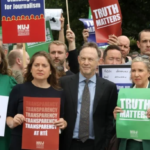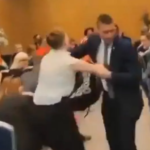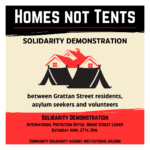Bill contains serious problems in its current form.
The Dáil is currently debating the Criminal Justice (Incitement to Violence or Hatred and Hate Offences) Bill 2022.
People Before Profit fully support the original idea behind the Bill which was to protect groups that are discriminated against and oppressed in our society from hate speech and hate crimes. However, the Bill contains some serious problems in its current form.
In December 2020, we helped launch the Le Cheile coalition with several groups. Its goal is to work together to counter any rise of fascism and the far right in this country to prevent it from gaining the kind of foothold it has in other European countries such as Italy, Sweden, and France.
People Before Profit is completely opposed to racism, sexism, homophobia, transphobia, ableism, Islamophobia and all other forms of prejudice and oppression. We condemn hate speech, threats, harassment, intimidation, and violence against anyone purely on the basis of the colour of their skin, their gender identity or sexual orientation.
The psychological impacts on victims of racist, sexist, homophobic and other forms of hate speech can be devastating, making people too scared to go out at night or to let their children out to play.
None of this should be happening in our society and action must be taken against it. We support the Coalition against Hate Crime Ireland’s call for greater government funding of education and outreach to combat hateful attitudes and to make protected groups aware of their rights, for better data gathering on hate speech and hate crimes and for better victim support.
We would like to acknowledge the excellent work carried out by all the member organisations of the Coalition Against Hate Crime Ireland. Organisations and networks like Pavee Point, the Irish Traveller Movement, the Irish Network Against Racism (INAR), the Irish Council for Civil Liberties and the Transgender Equality Network all have a proud track record in fighting against the many forms of prejudice, discrimination, and oppression.
However, People Before Profit will, unfortunately, be unable to support the Criminal Justice (Incitement to Violence or Hatred and Hate Offences) Bill 2022 in its current form.
We would request that the government take on board our critique of the Bill and look to make the changes that we feel are necessary, including the complete deletion of section 10, the deletion of the demonstration test, and for proper definitions of hatred and freedom of expression.
It is a real pity that the worthy goal of protecting oppressed groups from hate crimes has on the one hand been dealt with so badly by the Government and on the other that it has been so tangled up with provisions that increase the excessive powers of the state without including effective safeguards.
Speach by Paul Murphy TD on Hate Crime Legislation
I want to start by acknowledging the excellent work carried out by all the member organisations of the Coalition Against Hate Crime Ireland. Organisations and networks like Pavee Point, the Irish Traveller Movement, the Irish Network Against Racism (INAR), the Irish Council for Civil Liberties and the Transgender Equality Network all have a proud track record in fighting against the many forms of prejudice, discrimination, and oppression.
In December 2020, People Before Profit helped launch the Le Cheile coalition with several of these groups. Its goal is to work together to counter any rise of fascism and the far-right in this country to prevent it from gaining the kind of foothold it has in other European countries such as Italy, Sweden and France. People Before Profit is completely opposed to racism, sexism, homophobia, transphobia, ableism, Islamophobia and all other forms of prejudice and oppression. We condemn hate speech, threats, harassment, intimidation, and violence against anyone purely on the basis of the colour of their skin, their gender identity, or sexual orientation.
Unfortunately, all of this has become more common in recent years and far too little is being done about it. The latest annual report from INAR records 40 racist assaults in 2021, 39 cases of racist harassment and 13 threats to kill or cause serious harm. In one case, a mixed-race woman was asked by a stranger about her background in a supermarket and then sexually assaulted. In another, a Black-African woman was verbally abused and threatened with a 30cm knife held to her throat after she asked a stranger to respect social distancing in a bus station.
The psychological impacts on victims can be devastating, making them too scared to go out at night or to let their children out to play. One parent quoted in the report said that “my youngest son is getting scared to go out my door and play, in case of being called names.”
None of this should be happening in our society and action must be taken against it. We support the Coalition Against Hate Crime Ireland’s call for a National Action Plan Against Hate. This has to include much greater government funding of education and outreach to combat hateful attitudes and to make protected groups aware of their rights, for better data gathering on hate speech and hate crimes and for better victim support.
The best way to combat hate crimes is to prevent them from happening in the first place. For us as socialists, this means tackling the extreme inequality and oppression that is part and parcel of capitalism, that is written into its DNA. It’s in the interests of capitalists and this right-wing government to pit men and women, migrant and non-migrant, black and white, straight and LGBTQ, against each other, to have them blame each other for their problems, rather than to have them unite as workers and demand better wages, better public services, a better life for all. Refugees and migrants are not to blame for the housing and homelessness crisis or for low wages and poor working conditions. The ones to blame are Fianna Fáil and Fine Gael and the landlords, bosses and vulture funds they represent. We need to target our anger against the rotten system of capitalism that oppresses and exploits us all, not the people most marginalised and oppressed by it. This is also how we combat the far-right.
To turn to the detail of the legislation, I strongly support the original idea behind this Bill, which was to protect groups that are discriminated against and oppressed in our society from hate speech and hate crimes.
However, I am very concerned at how this Bill has been drafted by the government, in particular the lack of clear, human rights-based definitions and the insertion of problematic new clauses relating to hate speech that are wide open to abuse by individual District Court judges and Gardai. It’s mainly the sections on hate speech in Part 2 of the Bill that we find problematic. We agree with the Irish Council for Civil Liberties that hate speech should not have been bundled into the same Bill as hate crimes as the Government has done. However, we also have some issues with the manner in which less serious crimes can be treated as hate crimes in Part 3.
To begin with, the definition of hatred in section 2 which applies throughout the Bill is quote “hatred against a person or a group of persons in the State or elsewhere on account of their protected characteristics or any one of those characteristics”. That’s a tautological definition. In effect, as the Irish Council for Civil Liberties has pointed out, it says that “hatred is hatred”. I’m at a loss to understand why this definition was used rather than using more precise language. For example, hatred could be defined far more clearly as “a state of mind characterised as intense and irrational emotions of opprobrium, enmity, and detestation towards a person or a group of persons in the State or elsewhere on account of their protected characteristics or any one of those characteristics and that involves bias, prejudice, contempt or hostility”
In terms of the protected characteristics in Section 3, because of the shoddy way in which this Bill has been drafted by the Government, we have concerns that the inclusion of religion as a protected characteristic in exactly the same way as the other grounds could create a chilling effect on legitimate criticism of the Catholic Church. Potentially, this could even discourage people from criticising the Church’s promotion of exactly the kind of sexism, homophobia and transphobia that this Bill seeks to address. It could also potentially be used to level bogus charges of anti-Semitic hate speech against pro-Palestinian activists.
Section 11 on freedom of expression is also problematic. It protects quote “discussion or criticism of matters relating to a protected characteristic” but it fails to clearly defend the right to express information or ideas that may be offensive, shocking or disturbing to some. Using again the example of the Catholic Church, is it clear that strongly worded criticism of paedophile priests and the Church’s institutional cover-up of clerical sex abuse would be protected, especially if a case came before a religiously-minded District Court judge?
On the other hand, we are concerned that the general defence provided for – that the objectionable speech or behaviour “consisted solely of a reasonable and genuine contribution to literary, artistic, political, scientific, religious or academic discourse” could end up turning into a carte blanche for religiously-motivated homophobia or transphobia. Again, this problem could be addressed if there was a proper definition of hatred and a better definition of freedom of expression.
I now want to turn to the sections of the Bill that are totally unacceptable and should be taken out in their entirety.
Section 10 criminalises preparation or possession of hateful material “with a view to the material being communicated to the public or a section of the public” – even where the material has not actually been published. This would seem to amount to a form of “thought crime”. Subsection 3 states that where “it is reasonable to assume that the material was not intended for…personal use” the onus will be put onto the accused to prove their own innocence by showing that material they prepared, or even just material that they possessed, was never intended to be publicly communicated. This makes Section 10 a dangerous reversal of the fundamental principle of “innocent until proven guilty” as well as legislating for thought crime and should be taken out.
Section 15 allows a District Court Judge, on the say-so of a Garda of any rank, to issue a search warrant for any premises including people’s homes on suspicion that hate speech is being published or prepared for publication there. This grants the Gardai wide-ranging powers to search electronic devices and linked electronic devices, to demand passwords for people’s phones etc. There don’t appear to be any safeguards in place to prevent this from potential abuse by politically motivated judges or Gardai and it applies equally to offences under section 10 as to actual published hate speech or genocide denial.
Part 3 of the Bill deals with hate crimes. We support the idea that serious crimes like assault, threats to kill or cause serious harm, coercion, harassment, and endangerment should be treated as aggravated offences if hatred is a motivating factor. However, we are concerned about the manner in which the Government is seeking to apply the same rationale to some more minor offences.
I fear that the way the Bill is drafted means that some of the public order offences covered under Section 18 – in particular threatening, abusive or insulting behaviour in a public place – could be used as a weapon to stigmatise legitimate protesters by politically motivated Gardai. This is what happened in the Jobstown case with the much less obviously conducive legislation on false imprisonment when lying Gardai attempted to frame me and other peaceful protesters against water charges and get us locked up in prison for 20 years for taking part in a peaceful protest.
The Government’s decision to use a demonstration test as evidence of hatred rather than the usual test of a criminal motive heightens the risk of political abuse of this Section. This means that rather than having to prove hatred was a motive for abusive or insulting behaviour, in order to gain a conviction for abusive or insulting behaviour aggravated by hatred, all a Garda has to do is say under oath that someone used a racial or sexist slur during or immediately after abusive or insulting behaviour. As was shown repeatedly during the Jobstown trial, the media and the courts are likely to take their word for it unless there is clear video evidence to the contrary. The risk of political policing is further increased by the inclusion of wording that quote “It is immaterial whether or not an accused person’s hatred is also on account (to any extent) of any other factor.” This means that protesters with legitimate grievances could be stigmatised forever as hate criminals simply on a Garda’s say so.
Legal experts in this area, Jennifer Schweppe and Amanda Haynes point out in their submission on the Bill that the demonstration test is not used in hate crime legislation anywhere else in the world apart from the UK, Singapore and Malta. Ironically, it can lead to a disproportionate level of convictions of people from oppressed minorities for hate crimes. This has happened with black people in the UK. They also show how being convicted of a hate crime creates a stigma and can prevent people from finding employment, meaning that wrongful convictions for any form of hate crime have very serious life-long consequences for people.
For all these reasons, People Before Profit will, unfortunately, be unable to support this Bill as it is drafted. It is a real pity that the worthy goal of protecting oppressed groups from hate crimes has been dealt with so badly by the Government, including by tangling it up with provisions that grant excessive powers to the Gardai without including effective safeguards.
We will be submitting a range of amendments to the Bill at Committee Stage, including for the complete deletion of section 10, the deletion of the demonstration test, and for proper definitions of hatred and freedom of expression.











